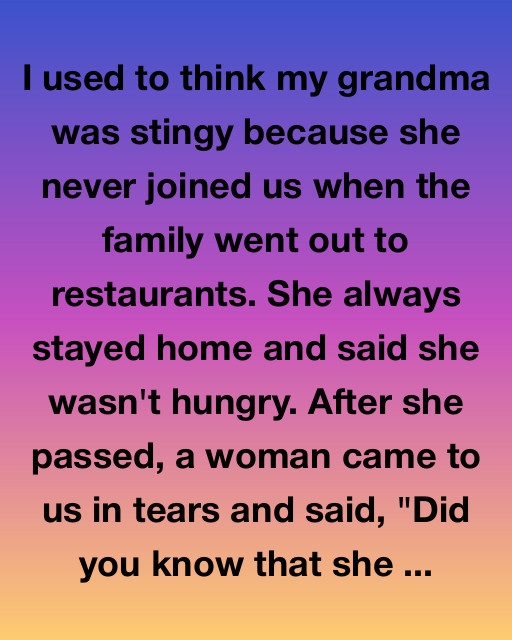I used to roll my eyes when Grandma Lourdes skipped family dinners out. She’d wave us off with a smile and say, “I’m not hungry,” then stay home in her worn slippers and soft cardigan. I told myself she was stingy, or just didn’t like crowds. After she died, a woman I’d never seen before came to the house with a crumpled photo and tears she could barely breathe through. “Did you know,” she asked, voice shaking, “that she bought my kids groceries every month for three years?”
We just stared. My mom, my uncle, me—three stunned faces in a living room that still smelled like her lavender soap. The woman’s name was Janine. She lived three blocks away, in the cramped apartments behind the church. Her husband left when the kids were little. No job at first, no family to fall back on, sometimes not enough food for a full dinner. One afternoon, Grandma passed her on the curb: a crying baby, a bag with a loaf of bread and two apples. Without questions or speeches, Grandma pressed a sealed envelope into her hand with a note that said, “Feed them. They deserve more.”
That single act became a quiet, steady river. My grandmother never told us. She’d say she was going for a walk, that she needed some air, sometimes that she was headed to the market. She’d come back empty-handed, and I’d think, there she goes again, saving money. Meanwhile, she was filling Janine’s pantry, covering the electric bill when the red notices came, and tucking a toy into their mailbox at Christmas like some small, stubborn Santa.
And then the door kept opening. A man in a wheelchair told us she visited his nursing home every week to play checkers and talk about the White Sox. A teenager said Grandma walked him through a college application line by line and gave him my late grandpa’s briefcase “for good luck.” People we’d never met carried stories like folded letters, smoothing them open in our hands.
When we started sorting her things, we found the proof she never planned for anyone to see. Notebooks—simple spiral ones—lined with dates and quick notes: “Paid electric bill for J.” “Dropped off bread + soup.” “Waved to lonely man on porch—he smiled.” There was a list titled, “People to pray for when I can’t sleep.” My name was there. My dad’s. Janine’s. Names tucked between grocery lists and reminders to water the geraniums.
I remembered snapping at her once over a pair of shoes with rubber thinning to paper. “Let me buy you a new pair,” I insisted. She chuckled, tapping the toe. “These shoes have more to walk.” I took it as stubbornness. Now I know it was direction.
I began retracing her path like you follow a constellation—small points suddenly making a shape. At the nursing home, there was a corner chair the staff called “Lourdes’ Spot.” At the grocery store, a kid named Roman told me she slipped him a ten-dollar tip at closing. “She said I reminded her of someone who needed to hear he was doing a good job.” His eyes glossed with pride he wore like a new jacket.
In the attic, my mom found a tin labeled “Rainy Day Fund.” Inside sat $872 and a note: “For whoever needs it most. Trust your heart.” We bickered the way families do—headstone, donation, emergency stash? A week later, Janine called: her oldest, Jordan, had been accepted to community college. He needed $870 for registration. The number twinned with the tin so neatly it felt like a nudge from somewhere patient and kind. We handed her the money. She brought a pie two days later and a card that read, “Thank you for finishing what she started.”
That night on the porch where Grandma sipped tea at dusk, I listened to the slow quiet of our street—the click of a bicycle wheel, the soft thrum of a distant radio, the breeze fingering the maple leaves. I felt her there, not in grief’s sharp edge, but in the gentle way streetlight spills across a sidewalk. I began a small ritual. On Sundays, instead of brunch, I picked someone to help. A sandwich for a man who looked like the day had been too long. Bus fare for a woman whispering apologies to a broken card reader. Tiny things. Pocket kindness.
Then life swerved. The company downsized. I left the building with a box of desk plants and pens and tried not to think about rent. I didn’t tell anyone. Pride is a sticky thing. One morning, I sat in a café, scrolling job boards with a knot in my throat. A young woman approached my table and tilted her head. “Are you Lourdes’ grandson?”
I nodded, startled, bracing for a story I didn’t have any energy to carry.
She smiled, a little shy. “I thought so. You have her eyes.” She told me Grandma used to read to her at the library on Tuesdays while her mom filled out applications in the next aisle. Then she slid a plain envelope across the table. “She told me kindness is a seed. You plant it, and one day it grows back to you when you need it. She told me to wait for the right moment. I think this is it.”
Inside was a check for $1,000.
I cried in that café like a person learning to breathe again. I paid rent. I found a job two weeks later. I sent flowers with a note that said, “Your seed bloomed.”
Since then, I’ve been thinking about the lives people live. Some are loud and lacquered, all spotlight and applause. Others are stitched with quiet thread: a hand on a shoulder, a pot of soup on a stoop, a bill slipped under a door. My grandmother lived a life that didn’t announce itself, but it rerouted currents. It turned ordinary days into safe harbors for people treading water.
We look for heroes in the big stories. The truth is, they sit at kitchen tables folding laundry and writing names they’ll pray over in the blue hours. They keep worn shoes because the road is long, not because they’re cheap. They say, “I’m not hungry,” and mean, “Someone else is.”
I don’t expect anything back when I pay for a coffee or leave an extra tip. But I smile, because I can hear her: Keep walking. Keep noticing. Keep choosing to give where you can. That’s the work.
If you’re still reading, maybe you’re thinking of your own quiet hero. Maybe someone like Grandma Lourdes kept your lights on once, or read to you on a Tuesday, or made sure your pantry didn’t echo. Or maybe you’ve been that person, and no one knows. If so, this is me, standing on my grandmother’s porch, telling you that what you did mattered.
You don’t need wealth to be generous. You don’t need a stage to make a difference. You need eyes that notice and a heart that won’t look away.
So wave to the man on the porch. Leave a kind note. Pick up the phone. Pay a bus fare. Buy the sandwich. It might feel like a pebble to you, but to someone else, it’s a bridge.
I used to think my grandma was stingy. Now I know she was rich in all the ways that count. And every time I step into a pair of shoes that “have more to walk,” I get to carry that wealth forward. That’s more than enough reward for me.


